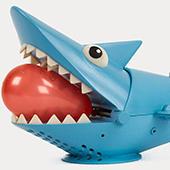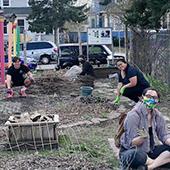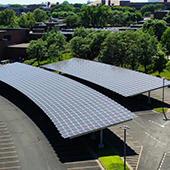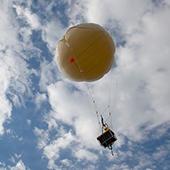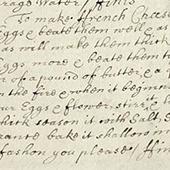Notice: Brief will not publish on Aug. 26. Weekly publication resumes Sept. 2.
- Features: A decade of playful innovation; Engineers Without Borders lends a hand locally.
- People: School of Public Health researchers have received nearly $2 million in grants to identify segments of human genetic code associated with the onset of diabetes; and more.
A decade of playful innovation
Ten years since it launched, and one name change later, Toy Product Design (now Product Innovation Lab) remains one of the University of Minnesota’s most popular courses. The course serves as an introduction to hands-on, team-based product design, and it’s open to any student who wants a real-world product design experience. Learn more and see a slideshow of 10 products in 10 years.
Engineers Without Borders lends a hand locally
If summer 2020 had been normal, students in the University of Minnesota chapter of Engineers Without Borders would be returning to the United States, having just installed a solar-powered cooker in a community in Ethiopia. However, with the COVID-19 pandemic putting their travel plans on hold, the students turned their attention to the Twin Cities community, partnering with a local organization that promotes environmental and racial justice by giving residents the opportunity to grow their own produce and manage community gardens.
People
School of Public Health researchers have received nearly $2 million in grants to identify segments of human genetic code associated with the onset of diabetes; 2020-21 Internationalizing Teaching and Learning Faculty Cohort; U in the News features highlights of U faculty and staff cited in the media. People
Prepare students for learning online
To foster student success with online learning, faculty and instructors are invited to share an enrollment link with their students to Learning Online 101, a self-paced online course. Learn more about the course and get tips for how you might engage students about what they learned, all on the Foster Student Success webpage.
Fall 2020 Grant-in-Aid competition
Applications for the fall 2020 Grant-in-Aid of Research, Artistry, and Scholarship program will be accepted starting Aug. 17. Sponsored by the Office of the Vice President for Research, the program promotes the research, scholarly, and artistic activities of faculty and provides seed funding for a wide range of projects in seven funding categories, including a Multicultural Research category. Note: Applications for Blue Heron ship time from PIs on the Twin Cities campus and the use of the Driven to Discover Building at the 2021 State Fair are welcome. The deadline to submit applications to approvers is Sept. 14; deadline for approvers to submit final applications to OVPR is Sept. 17.
Faculty Research Development grants now open
The Office of Academic Clinical Affairs is soliciting applications for Faculty Research Development grants that will support new or expanding interdisciplinary research that addresses significant clinical issues, is innovative, and has a high potential for return on investment. The deadline to submit a competitive LOI is Sept. 25.
U of M expands clinical investigation of engineered iPSC-derived natural killer cells
The first patient has received treatment in a new clinical trial that has opened at the University of Minnesota to test whether a novel cell therapy currently under clinical investigation as a treatment for acute myeloid leukemia and lymphoma can be effective as a treatment for COVID-19.
Virtual CPR training
When the COVID-19 pandemic hit and CPR training came to a hard stop, the staff at the Center for Resuscitation Medicine quickly realized that they needed to find an alternative to the vital face-to-face trainings. Through its partnership with the Office of Academic Clinical Affairs, the center is dedicated to improving outcomes for sudden cardiac arrest and committed to advancing research, education, and community engagement.
Minnesota a leader in biochar research and demonstration
Biochar is gaining interest around the globe. It’s a material that can be made from forest resources—like ash trees killed by beetles or excess wood residuals—that can address a lot of challenges. Biochar material filters harmful chemicals from stormwater runoff, enhances soil health, increases soil drought resistance, and stores carbon in soils to mitigate climate change. The Natural Resources Research Institute (NRRI) is working to understand its potential for environmental remediation and as a new market for forest resources.
Evaluating diversity and inclusion in the health services and policy research workforce
Structural racism is a known factor contributing to health, workplace, and other inequities across the United States. A new School of Public Health study is measuring whether the field of health services and policy research has made any significant progress to improve diversity and inclusion. PhD student Tongtan Chantarat is co-leading the study, funded by AcademyHealth.
Health as a birthright
Jewelean Jackson is the first Black woman elected as board chair for the University of Minnesota Community-University Health Care Center. This is her ninth year as board member director. She shares her experiences in leadership as a Black woman and addresses a history of medical distrust for Black communities and healthcare providers, and advocates for more Black youth to enter health care professions.
Rybak interviews Michael Rodriguez on educational equity in the age of COVID-19
Michael Rodriguez—associate dean, incoming interim dean, and Campbell Leadership Chair in the College of Education and Human Development and professor in the Department of Educational Psychology—talks with former Minneapolis mayor R.T. Rybak and Patrice Relerford. In the interview, the three discuss a new report—Reimagine Education—that tackles educational equity in the age of COVID-19.
Research Brief: Nearly one in four young people experience food insecurity from adolescence to adulthood
A new School of Public Health study recently examined the prevalence of food insecurity in young people and found that nearly one in four people making the transition from adolescence to adulthood lacked enough food to eat. The study was completed prior to the economic disruption of the COVID-19 pandemic, which likely has increased the extent and severity of food insecurity in the U.S. Additional recent Research Briefs include “Breaking molecular traffic jams with finned nanoporous materials” and “Rural areas have higher individual health insurance premiums and fewer plan choices.”
2020-21 Northrop season announcement
The 2020-21 Northrop season is like no other—with new works, new ways of accessing art, new theater-going expectations, and new ways of experiencing the presentations. The season includes seven remarkable companies in the dance series; two renowned musicians in the pipe organ music series; a film series; the Northrop Centennial Commissions; and many artist engagement activities such as performance previews, master classes, and virtual happy hours and Q&A sessions. See a video of the 2020-21 season highlights. Access an audio-described version of the video here.
U of M featured virtual events
Aug. 12 - Universe @ Home: Asteroid Adventures and Majestic Meteors
Aug. 13 - Election Security: Security for Whom?
Aug. 13 - COVID-19 and the Globally Displaced
Aug. 19 - Having Meaningful Conversations on Sensitive Topics
Aug. 19 - Universe @ Home: Current events in astronomy
Aug. 19 - Gallim: Virtual happy hour
Aug. 20 - Solving Career Burnout During COVID-19
Aug. 30 - Yoga Retreat Day at the Arboretum
Crookston Mano Amiga rural program receives USDA grant
The University of Minnesota Crookston has received a $100,000, one-year grant from the United States Department of Agriculture Rural Development agency to fund the Mano Amiga program of the Veden Center for Rural Economic Development. The Veden Center works to increase employment and entrepreneurship opportunities among the growing Latino community in Crookston and the Polk County areas surrounding the university.
Safer iodine compounds
Professor Viktor Zhdankin, Department of Chemistry and Biochemistry, recently received a National Science Foundation Creative Extension Award grant for his study of polyvalent iodine reagents. Unlike most reagents, which are based on heavy metals, Zhdankin’s reagents are non-toxic and safer for the environment, which means they have applications in medicine, agriculture, and industry. The new grant extends a previous NSF grant until 2023.
U Medical School studying colorectal cancer disparities in East African men
Motohiro Nakajima, a faculty member at the Medical School, Duluth campus, leads a team studying psychosocial factors and cultural beliefs that keep East African men who immigrated to the United States from seeking the cancer screenings they need to prevent the disease. Minnesota has one of the highest populations of people from East African countries, specifically Somalia and Ethiopia.
Lindberg talks politics with MinnPost
Tim Lindberg ’06, assistant professor of political science, is quoted in MinnPost’s “In Minnesota’s Seventh District, Republicans weigh who’s best to take on Collin Peterson.” Lindberg is an expert on the rural-urban divide in Minnesota politics, political behavior, and American political development.
COVID-19 live virus research in a specialized lab
Brady Zell, UMR class of 2018 and current biomedical sciences PhD student at Mayo Clinic College of Medicine, works in a specialized lab at Mayo Clinic to study SARS-CoV-2. Zell is working on developing a new vaccine strategy and studies viruses to determine how they use receptors, proteins, and other components to affect human cells.
Online course reserves at the Libraries
Have you used print course reserves in the past for your courses? Due to the need to quarantine materials, the U of M Libraries will not offer print reserves for fall semester 2020. Instead, Libraries will help you set up your course materials online. Visit Online Reserve Information for Faculty to learn about options and COVID, Copyright, and Courses for up-to-date copyright considerations.
New solar array installed on Twin Cities campus
Installation is now complete on a new solar array on the Twin Cities campus. Located in the S104 lot in St. Paul, across from the State Fair transit hub, the solar carport will produce approximately 481,000 kilowatt hours per year—enough electricity to power about 45 average Minnesota homes. Thanks to the project team across campus for making this exciting addition to the University's renewable energy portfolio possible. Watch a video about the project.
WiFi coverage map
Since classes will be taught in a mix of in-person, online, remote, and blended formats this fall, faculty, staff, and students should check out the WiFi coverage map throughout the semester. This interactive map will indicate the best WiFi coverage in each campus building, which will be helpful as students attend their online, remote, or blended classes across campus.
Bookstore reopens Aug. 17
The Bookstore in Coffman Union will reopen Aug. 17 with regular store hours of Monday-Friday, 8:30 a.m.-5:30 p.m., and Saturday, 10 a.m.-4 p.m. When visiting Bookstores visitors will notice a reconfigured shopping experience and enhanced safety measures including separate entrances and exits, capacity limits, face-covering requirements, protective barriers, distancing reminders, and more. Bookstores also requires students to use its e-commerce site at bookstores.umn.edu to place all course material orders. Learn more about Bookstores safe opening procedures.
Ten courses that will blow your mind
The delivery of education may have changed in the time of COVID-19, but the excitement of learning has not. Discovery, exploration, creation, and conversation are hallmarks of learning, and you can still find them all in courses offered at the University of Minnesota. Here are 10 introductory-level courses that illustrate why education can be fun—and relevant—in today’s world.
Ye olde Wangensteen cook-off
U of M Libraries assistant curator Emily Beck and student employee Katie Minarsich decided to dive back into the manuscript recipe collection of the Wangensteen Historical Library of Biology and Medicine, embarking on a journey of deciphering, baking, and eating a 1500s recipe for “French Cheese Cakes.”
